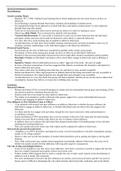Social Psychological Explanations 1
Peer Influences
Social Learning Theory
- Bandura (1977, 1986): Outlined social learning theory which emphasises the role social factors can have on
behaviour.
- Social learning is learning through observation, imitation and modelling of another person.
- He expanded the behaviourist approach to include both direct and indirect reinforcement- we learn indirectly
through observing other people.
- There are two key processes which need to motivate an observer in order for learning to occur:
- Observing a Role Model: This is someone they identify with and admire.
- Vicarious Reinforcement: If a role model is reinforced in some way for their behaviour then the individual
anticipates similar outcomes and rewards for themselves and is likely to repeat the behaviour.
- It is clear, then, how social learning may be applied to addictive behaviours.
- An individual may see their peers (role models) smoking, and these peers are being rewarded in some way by
smoking (vicarious conditioning), so the individual engages in the behaviour themselves.
Perceived Social Norms
- Social norms are the rules of behaviour considered acceptable within certain social groups.
- Perceptions of these norms among peer groups can have an effect on an individual’s behaviour.
- Research in this area has particularly focused on how these might affect alcohol consumption among students.
- Descriptive Norms: an individual’s perception of how much others engage in behaviours such as drinking or
smoking
- Injunctive Norms: what an individual perceives as others’ approval of the norm, ‘the norm of ought.’
- In terms of alcohol consumption, it has been suggested that students overestimate the descriptive and injunctive
norms within their peer group
- They believe their peers are drinking more than they are, and that it is more socially acceptable.
- Perkins and Berkowitz (1986): high proportion of students believed that being intoxicated was only acceptable in
limited circumstances, but a high proportion also thought their peers thought it was acceptable.
- An individual acts in a way they think their group will find acceptable, and they do not see the need to reduce their
consumption, because they believe everyone else is drinking more anyway.
Evaluation
Research Evidence
- Morton and Farhat (2010): reviewed 40 prospective studies into the relationship between peers and smoking; all but
one showed a positive correlation between the two.
- Similar results have been found for other addictive behaviours.
- The studies were prospective studies which provides greater support for a causal relationship between peer
influence and engaging in addictive behaviours.
Peer Influence or Peer Selection (Cause or Effect)
- A key problem with research into peer influences on addictive behaviour is whether the peers influence the
individual to engage in addictive behaviour, or whether individuals seek out others who also engage in the
behaviour.
- It is likely that the two engage with each other, though the role of peer selection is often underestimated or
overlooked in research.
- Ennett and Bauman (1994): participants who were non-smokers at the start of the study and who had smoking
friends were more likely to smoke at the follow up- this is evidence of peer influence.
- In addition, there was evidence that individuals had changed membership of friendship groups in line with their
smoking/non-smoking behaviour.
- Thus, peer groups and social norms may both explain and be explained by addictive behaviours.
Research into perceived social norms
- Neighbors et al (2007): descriptive and injunctive norms were the best predictor of alcohol consumption among a
sample of US college students.
- However, that were not the best predictor of alcohol related problems such as getting into fights or driving after
drinking.
- Thus, while social norms may explain initial engagement in potentially addictive behaviours, they may not be
behind why people actually develop addictions with long-term negative consequences.
The role of other psychological factors
- It may be too simplistic to say that ‘peers cause addiction’ since there is extensive research to support the fact that
there are complex biological and cognitive factors involved as well.
- Further, Kobus (2003) suggests that we need to consider the role of wider social contexts in the development of
addiction such as family and community.
- The exact mechanisms involved in the peer influences are unclear, perceived social norms and SLT are just two
factors and it is difficult to disentangle the web which includes other factors like conformity and social identity.





